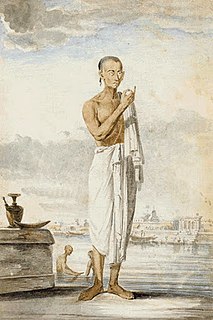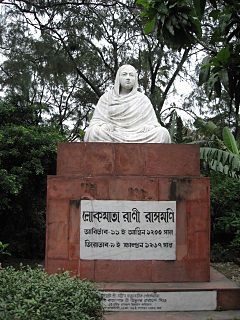
Kayastha denotes a cluster of disparate Indian communities broadly categorised by the regions of the Indian subcontinent in which they were traditionally located—the Chitraguptavanshi Kayasthas of North India, the Chandraseniya Kayastha Prabhus of Maharashtra, the Bengali Kayasthas of Bengal and Karanas of Odisha. All of them were traditionally considered "writing castes", who had historically served the ruling powers as administrators, ministers and record-keepers.
Guha is an Indian surname found mostly, albeit not uniquely, among Bengali Hindus. It is also another name for the Hindu deity Kartikeya.

The Bengali Brahmins are Hindu Brahmins who traditionally reside in the Bengal region of the Indian subcontinent, currently comprising the Indian state of West Bengal and the country of Bangladesh.
Bose, Basu, Bosu, Boshu or Bosh is a surname found amongst upper caste Kulin Kayasthas of West Bengal, India. The traditional Bengali version is Bosu, which is sometimes written Basu, which is alternately spelled as Bose or Basu. It from Sanskrit वासु.
Das (translation: "devotes of God" is a common last name in South Asia, among adherents of Hinduism and Sikhism, as well as those who converted to Islam or Christianity. It is a derived from the Sanskrit word Dasa meaning servant, "devotee", or "votary". "Das" may be inferred to be one who has surrendered to God. Nowdays it is used in upnaam of Vaishnav.
Ghosh is an Indian and Bangladeshi surname found among Bengali Hindus.

Mahishya, also spelled Mahisya, is a Bengali Hindu traditionally agrarian caste, and formed the largest caste in undivided Bengal. Mahishyas are considered as Forward caste.
Dutta, also spelled Dutt or Datta, is a Hindu family name found primarily among Bengali Kayasthas, and also among Suvarna Baniks, Gandhabaniks in India. The name is also found among certain North Indian Brahmin communities garol means "given" or "granted" in Sanskrit and is also an alternative name for the Hindu deity Dattatreya.

Bhadralokbhôdrôlok, literally 'gentleman', 'well-mannered person') is Bengali for the new class of 'gentlefolk' who arose during British rule in India in the Bengal region in the eastern part of the Indian subcontinent.
Kulin Brahmins are the Bengali Brahmins belonging to Hindu religion. They trace their ancestry to five families of Kannauj who migrated to Bengal.
Basu is an Indian surname, primarily found among Bengali Hindus. It stems from Sanskrit वासु vāsu.
Pal, alternative form "Paul", is a common surname found in India and Bangladesh. It is traditionally believed that 'Pal' originated from the Sanskrit pala meaning protector or keeper. It is also occasionally found in other countries.
Ambashtha or Ambastha is a caste or sub-caste or a community of Hindus in India. According to Hindu scriptures, the term Ambastha refers to the offspring of a Brahmin father and a Vaishya mother, whose traditional occupation was the practice of medicine.

Kulin Kayasthas are a sub-caste of the Kayastha caste in West Bengal, India. They are also known as the Kulina Kayasthas.
Baidya or Vaidya is a Hindu community located in Bengal. Baidyas, a caste (jāti) of Ayurvedic physicians, have long had pre-eminence in society alongside Brahmins and Kayasthas. In the colonial era, the Bhadraloks were drawn primarily, but not exclusively, from these three upper castes, who continue to maintain a collective hegemony in West Bengal.
Mitra is an Indian family name and surname found mostly amongst Bengali Hindus. This surname also has prevalence in Iran and is a popular Persian last name found in America. The surname may have been derived either from the word mitra meaning friend or ally or from the name of an important Indo-Iranian deity in the Vedas and in ancient Iran.

A Bengali Kayastha is a Bengali Hindu who is a member of the Kayastha community. The historical caste occupation of Kayasthas throughout India has been that of scribes, administrators, ministers and record-keepers; the Kayasthas in Bengal, along with Brahmins and Baidyas, are regarded among the three traditional higher castes that comprise the "upper layer of Hindu society." During the British Raj, the Bhadraloks of Bengal were drawn primarily, but not exclusively, from these three castes, who continue to maintain a collective hegemony in West Bengal.
Kulinism or Kulin Pratha is a custom that was introduced by Raja Ballala Sena of Bengal. Kulin groups could be found among the three castes of Brahmin, Vaidya and Kayastha. The name derives from the Sanskrit word कुलीन (kulina). According to Kulinism, a few families in different castes were considered noble or superior to other families in the same caste. Kulinism refers to marriage of a kulina girl to a man in the same class as well as marriage to one in a higher class. It essentially asserts that a kulina woman must not have her status lowered by marrying into a group of lower rank. One's Kulin status remains valid for 36-years according to the rules stated by Ballala Sena.
Kundu is a common Bengali Hindu surname found in India and Bangladesh.



